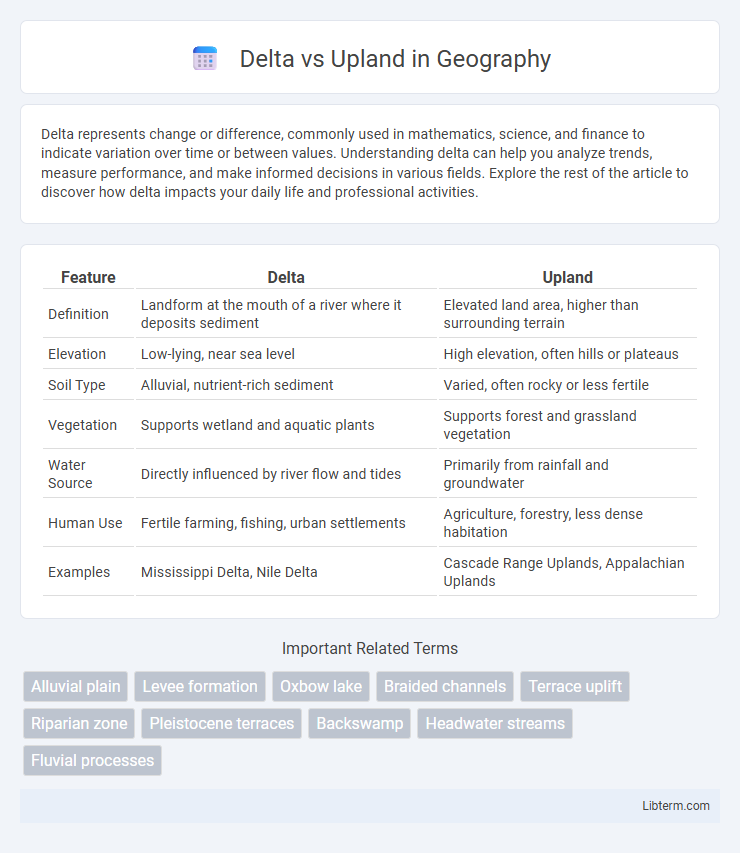Delta represents change or difference, commonly used in mathematics, science, and finance to indicate variation over time or between values. Understanding delta can help you analyze trends, measure performance, and make informed decisions in various fields. Explore the rest of the article to discover how delta impacts your daily life and professional activities.
Table of Comparison
| Feature | Delta | Upland |
|---|---|---|
| Definition | Landform at the mouth of a river where it deposits sediment | Elevated land area, higher than surrounding terrain |
| Elevation | Low-lying, near sea level | High elevation, often hills or plateaus |
| Soil Type | Alluvial, nutrient-rich sediment | Varied, often rocky or less fertile |
| Vegetation | Supports wetland and aquatic plants | Supports forest and grassland vegetation |
| Water Source | Directly influenced by river flow and tides | Primarily from rainfall and groundwater |
| Human Use | Fertile farming, fishing, urban settlements | Agriculture, forestry, less dense habitation |
| Examples | Mississippi Delta, Nile Delta | Cascade Range Uplands, Appalachian Uplands |
Introduction to Delta and Upland
Delta Air Lines, a major American airline headquartered in Atlanta, operates an extensive global network serving over 300 destinations across six continents. Upland Software, a cloud-based enterprise work management software provider, specializes in automating business processes like project management, document management, and workflow automation. Both companies drive efficiency and connectivity, with Delta excelling in air transportation logistics and Upland enhancing operational productivity through advanced cloud technology.
Overview of Delta: Key Features
Delta offers robust financial tracking with automatic transaction synchronization, multi-currency support, and real-time portfolio updates, ideal for investors seeking comprehensive asset management. Its intuitive interface provides detailed analytics, including profit/loss visualization and investment performance metrics across stocks, cryptocurrencies, and ETFs. Advanced alerts and custom watchlists empower users to monitor market trends and portfolio changes effectively.
Upland: Core Concepts and Highlights
Upland operates as a blockchain-based virtual property trading game, emphasizing digital real estate and NFT ownership within a metaverse. Players buy, sell, and trade virtual properties mapped to real-world addresses, generating in-game income through property development and community engagement. The platform integrates blockchain technology to ensure secure, transparent transactions and offers unique opportunities for players to earn via play-to-earn mechanics and secondary market activities.
Comparative Blockchain Technology
Delta utilizes a hybrid blockchain architecture combining public and private chains to enhance scalability and security, whereas Upland operates primarily on a public blockchain leveraging EOS for faster transaction speeds. Delta integrates advanced consensus mechanisms like Delegated Proof of Stake (DPoS) to reduce latency and increase throughput, while Upland emphasizes interoperability with NFT standards for seamless digital asset trading. The comparative blockchain technology of Delta and Upland highlights a trade-off between privacy-focused scalability and decentralized asset ownership within virtual real estate ecosystems.
Tokenomics and In-Game Currency
Delta features a dual-token system comprising DELTA for governance and utility, alongside in-game currency used for transactions and rewards, ensuring player engagement and economic stability. Upland utilizes UPX as its main in-game currency, which players earn through property trading and can convert to real-world currencies, fostering a decentralized virtual economy. Both platforms emphasize transparent tokenomics to maintain value circulation and incentivize active participation within their metaverse ecosystems.
Virtual Real Estate Mechanics
Delta and Upland implement distinct virtual real estate mechanics that cater to different user experiences. Delta emphasizes a dynamic market with fluctuating property values based on user interaction and limited parcel availability, fostering competitive trading and investment strategies. Upland features a blockchain-based property ownership system with verifiable digital deeds, enabling users to buy, sell, and develop properties within a map modeled after real-world locations, integrated with tasks and rewards to enhance user engagement.
Community and User Engagement
Delta and Upland prioritize community building and user engagement through distinct approaches. Delta fosters a collaborative environment with frequent community events, active forums, and real-time support that encourage user interaction and feedback. Upland emphasizes immersive gameplay within a virtual property universe, incentivizing participation through in-game economic activities and social features that enhance user retention and engagement.
Security and Transparency
Delta offers robust security features including end-to-end encryption and multi-factor authentication that ensure optimal protection of user data. Upland emphasizes transparent blockchain technology, leveraging immutable ledgers for verifiable digital asset ownership and transaction history. Both platforms prioritize integrity, but Delta's focus lies in advanced cybersecurity, while Upland delivers enhanced transparency through decentralized ledger systems.
Market Potential and Future Growth
Delta Air Lines holds a significant market potential due to its expansive global network and strong brand presence, catering to both domestic and international travelers. Upland Software, specializing in cloud-based enterprise work management solutions, is positioned for future growth driven by increasing digital transformation trends across industries. The scalability of Upland's platform and Delta's expanding route portfolio highlight their respective strategies to capture emerging market opportunities and sustain long-term growth.
Final Verdict: Which Platform Wins?
Delta excels in providing real-time portfolio tracking with intuitive visualizations and comprehensive cryptocurrency support, making it ideal for active investors seeking detailed insights. Upland stands out for gamified property trading and blockchain integration, appealing to users interested in virtual real estate and decentralized ownership. Given the focus on robust financial tracking and analytics, Delta wins as the superior platform for serious portfolio management.
Delta Infographic

 libterm.com
libterm.com